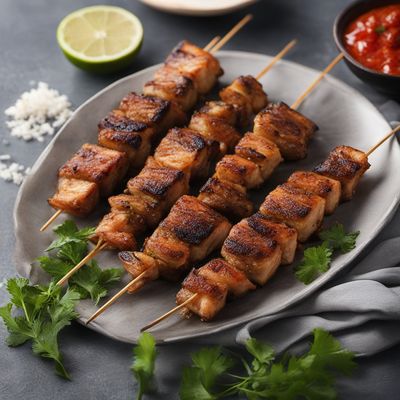
Ingredient
Bighead carp
The Charming Chub
Chub is a small to medium-sized fish with a rounded body, silver scales, and a slightly protruding mouth. It has a tender, white flesh that is mild and subtly sweet, making it a versatile ingredient in various dishes. Whether pan-fried, baked, or used in soups and stews, chub adds a delightful touch to any meal.
Origins and history
Chub is native to Europe and Asia, where it can be found in rivers, lakes, and ponds. It has been enjoyed as a food source for centuries, particularly in countries like Germany, Poland, and Russia. Chub fishing is a popular recreational activity in many regions, attracting anglers with its abundance and sporting qualities.
Nutritional information
Chub is a good source of protein and contains essential nutrients such as omega-3 fatty acids, vitamin D, and vitamin B12. It is also low in calories and fat, making it a healthy choice for those watching their diet.
Allergens
Chub is not known to be a common allergen. However, individuals with fish allergies should exercise caution and consult a healthcare professional if they have any concerns or known sensitivities.
How to select
When selecting chub, look for fish with clear, bright eyes, shiny scales, and a fresh, clean smell. The flesh should be firm and spring back when touched. Avoid fish with dull eyes, discolored skin, or a strong fishy odor.
Storage recommendations
To maintain its freshness, store chub in the refrigerator at a temperature between 32°F and 38°F (0°C and 3°C). It is best to consume it within 1-2 days of purchase. If you are unable to consume it within that time frame, you can freeze chub for up to 3 months.
How to produce
Chub can be found in the wild, but it is not commonly produced commercially. If you are interested in fishing for chub, make sure to obtain the necessary permits and follow local fishing regulations. Alternatively, you can consider joining a fishing club or seeking guidance from experienced anglers.
Preparation tips
Chub can be prepared in various ways, including pan-frying, baking, grilling, or poaching. Its delicate flavor pairs well with light seasonings like lemon, dill, or parsley. For a simple and delicious preparation, coat chub fillets in flour, season with salt and pepper, and pan-fry them in butter until golden and crispy. Serve with a squeeze of lemon and a side of steamed vegetables for a delightful meal.
Substitutions
Trout or whitefish can be used as substitutes for chub, as they share a similar delicate flavor and texture. However, keep in mind that the taste may differ slightly.
Culinary uses
Chub is commonly used in dishes such as pan-fried chub fillets, chub chowder, or chub fish cakes. It can also be smoked or pickled for added flavor and versatility. In some regions, chub is considered a delicacy and is often served in upscale restaurants or enjoyed during special occasions.
Availability
Chub is commonly found in Europe and Asia, particularly in countries like Germany, Poland, Russia, and China. It can be found in rivers, lakes, and ponds in these regions.
More ingredients from this category

Black carp
The Mighty Black Carp

Goldfish
The Delightful Fish-Shaped Snack

Catla
The Mighty Catla: A Versatile Ingredient

Carp, common
The Versatile Delicacy: Unveiling the Secrets of Common Carp

Carp, grass
The Versatile Carp: Exploring the Culinary Potential of Grass Carp

Carp, indian (generic)
The Versatile Indian Fish

Mud carp
The Versatile Mud Carp: A Culinary Delight

Labeo carps (generic)
The Versatile Carp Family

Silver carp
The Versatile Silver Carp

Crucian carp
The Versatile Delicacy of Crucian Carp
